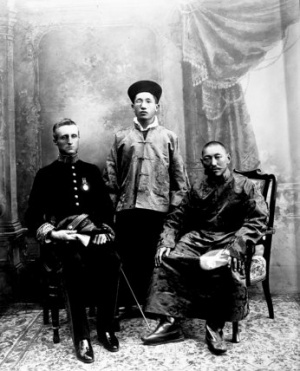Difference between revisions of "Sidkeong Tulku Namgyal"
| Line 1: | Line 1: | ||
[[File:13th Dalai Lama, Sir Charles Bell and Maharaj Kumar Sidkeong Trul-ku.jpg|thumb|The [[13th Dalai Lama]], Sir [[Charles Bell]] (both seated) and [[Maharaj]] [[Kumar]] Sidkeong Trul-ku ([[standing]] between the other two) pose for photograph, 1910, [[Calcutta]].]] | [[File:13th Dalai Lama, Sir Charles Bell and Maharaj Kumar Sidkeong Trul-ku.jpg|thumb|The [[13th Dalai Lama]], Sir [[Charles Bell]] (both seated) and [[Maharaj]] [[Kumar]] Sidkeong Trul-ku ([[standing]] between the other two) pose for photograph, 1910, [[Calcutta]].]] | ||
| − | [[Sidkeong Tulku Namgyal]] (1879–5 December 1914) was the ruling [[Maharaja]] and [[Chogyal | + | |
| + | |||
| + | |||
| + | [[Sidkeong Tulku Namgyal]] (1879–5 December 1914) was the ruling [[Maharaja]] and [[Chogyal of Sikkim]] for a brief period in 1914, from 10 February to 5 December. | ||
=={{Wiki|Biography}}== | =={{Wiki|Biography}}== | ||
| − | He was the eldest son and heir of [[Maharaja]] Sri Panch Sir Thutob | + | He was the eldest son and heir of [[Maharaja]] [[Sri Panch Sir Thutob Namgyal]], and was educated at St. Paul's School, {{Wiki|Darjeeling}} and at [[Pembroke College]], {{Wiki|Oxford}}. A polyglot, he was learned in {{Wiki|Chinese}}, [[English]], {{Wiki|Hindi}}, [[Lepcha]], {{Wiki|Nepali}} and [[Tibetan]]. |
| − | He was [[recognized]] as the [[reincarnation]] of his uncle, | + | He was [[recognized]] as the [[reincarnation]] of his uncle, [[Sidkeong Namgyal]], the [[abbot]] of [[Phodong Monastery]]. [[Sidkeong Tulku Namgyal]] reconstructed the [[monastery]]. |
After his [[education]] in {{Wiki|Oxford}}, he returned to [[Sikkim]] where he was closely associated with the administration of the country. He worked to dissolved the [[greed]] that occurs in vested interests and tried to unify [[Buddhists]] by renovating [[monasteries]] and their roles. | After his [[education]] in {{Wiki|Oxford}}, he returned to [[Sikkim]] where he was closely associated with the administration of the country. He worked to dissolved the [[greed]] that occurs in vested interests and tried to unify [[Buddhists]] by renovating [[monasteries]] and their roles. | ||
| − | When {{Wiki|Alexandra David-Néel}} was invited to the {{Wiki|royal}} [[monastery]] of [[Sikkim]], she met [[Sidkeong Tulku Namgyal]], at that time [[Maharaj]] [[Kumar]] ({{Wiki|crown}} {{Wiki|prince}}). She became Sidkeong's "confidante and [[spiritual]] sister", perhaps her lover. | + | When {{Wiki|Alexandra David-Néel}} was invited to the {{Wiki|royal}} [[monastery]] of [[Sikkim]], she met [[Sidkeong Tulku Namgyal]], at that time [[Maharaj]] [[Kumar]] ({{Wiki|crown}} {{Wiki|prince}}). She became [[Sidkeong's]] "confidante and [[spiritual]] sister", perhaps her lover. |
Following an attack of jaundice, [[Sidkeong Tulku Namgyal]] [[died]] of [[heart]] failure on 5 December 1914, aged 35, in most suspicious circumstances. He was succeeded by his younger brother, [[Tashi Namgyal]]. | Following an attack of jaundice, [[Sidkeong Tulku Namgyal]] [[died]] of [[heart]] failure on 5 December 1914, aged 35, in most suspicious circumstances. He was succeeded by his younger brother, [[Tashi Namgyal]]. | ||
| Line 19: | Line 22: | ||
* 1879-1899: {{Wiki|Prince}} [[Sidkeong Tulku Namgyal]] | * 1879-1899: {{Wiki|Prince}} [[Sidkeong Tulku Namgyal]] | ||
| − | * 1899-1911: Maharajkumar Sri Panch | + | * 1899-1911: [[Maharajkumar Sri Panch Sidkeong Tulku Namgyal]] |
| − | * 1911-1913: Maharajkumar Sri Panch | + | * 1911-1913: [[Maharajkumar Sri Panch Sidkeong Tulku Namgyal]], CIE |
| − | * 1913-1914: Lieutenant Maharajkumar Sri Panch | + | * 1913-1914: [[Lieutenant Maharajkumar Sri Panch Sidkeong Tulku Namgyal]], CIE |
| − | * 1914: Lieutenant His Highness Sri Panch Sikeong | + | * 1914: Lieutenant His Highness [[Sri Panch Sikeong Tulku Namgyal]], [[Maharaja Chogyal of Sikkim]], CIE |
==Honours== | ==Honours== | ||
| − | * | + | * [[Delhi Durbar Medal]]-1903 |
| − | * | + | * [[Delhi Durbar Medal]]-1911 |
* Companion of the Order of the [[Indian]] [[Empire]] (CIE)-1911 | * Companion of the Order of the [[Indian]] [[Empire]] (CIE)-1911 | ||
Latest revision as of 04:33, 2 February 2016

Sidkeong Tulku Namgyal (1879–5 December 1914) was the ruling Maharaja and Chogyal of Sikkim for a brief period in 1914, from 10 February to 5 December.
Biography
He was the eldest son and heir of Maharaja Sri Panch Sir Thutob Namgyal, and was educated at St. Paul's School, Darjeeling and at Pembroke College, Oxford. A polyglot, he was learned in Chinese, English, Hindi, Lepcha, Nepali and Tibetan.
He was recognized as the reincarnation of his uncle, Sidkeong Namgyal, the abbot of Phodong Monastery. Sidkeong Tulku Namgyal reconstructed the monastery.
After his education in Oxford, he returned to Sikkim where he was closely associated with the administration of the country. He worked to dissolved the greed that occurs in vested interests and tried to unify Buddhists by renovating monasteries and their roles.
When Alexandra David-Néel was invited to the royal monastery of Sikkim, she met Sidkeong Tulku Namgyal, at that time Maharaj Kumar (crown prince). She became Sidkeong's "confidante and spiritual sister", perhaps her lover.
Following an attack of jaundice, Sidkeong Tulku Namgyal died of heart failure on 5 December 1914, aged 35, in most suspicious circumstances. He was succeeded by his younger brother, Tashi Namgyal.
Palden Thondup Namgyal was subsequently recognized as the reincarnate leader of Phodong.
Titles
- 1879-1899: Prince Sidkeong Tulku Namgyal
- 1899-1911: Maharajkumar Sri Panch Sidkeong Tulku Namgyal
- 1911-1913: Maharajkumar Sri Panch Sidkeong Tulku Namgyal, CIE
- 1913-1914: Lieutenant Maharajkumar Sri Panch Sidkeong Tulku Namgyal, CIE
- 1914: Lieutenant His Highness Sri Panch Sikeong Tulku Namgyal, Maharaja Chogyal of Sikkim, CIE
Honours
- Delhi Durbar Medal-1903
- Delhi Durbar Medal-1911
- Companion of the Order of the Indian Empire (CIE)-1911
Source
Wikipedia:Sidkeong Tulku Namgyal